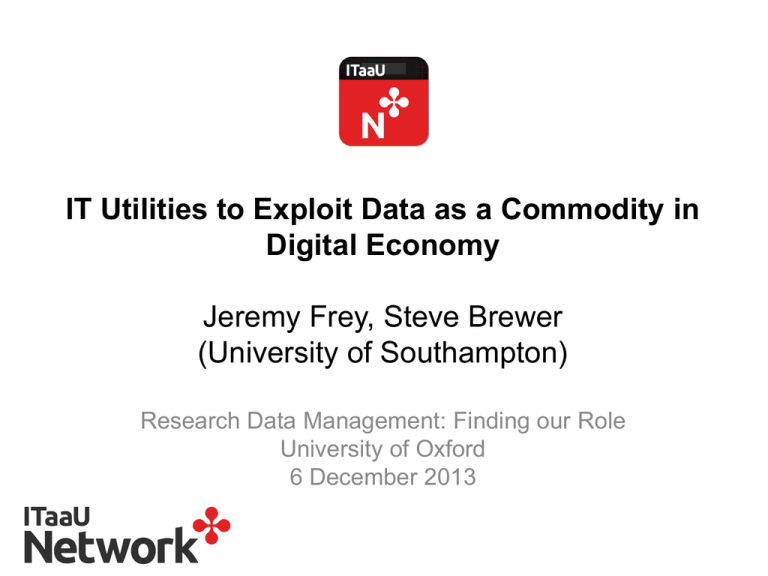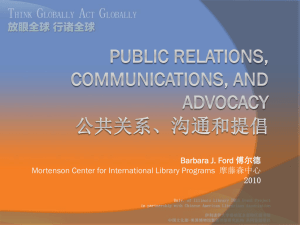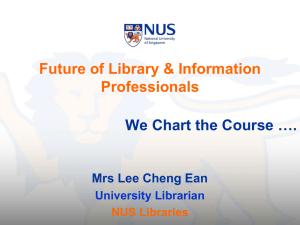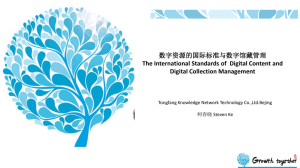IT Utilities to Exploit Data as a Commodity in Digital Economy
advertisement

IT Utilities to Exploit Data as a Commodity in Digital Economy Jeremy Frey, Steve Brewer (University of Southampton) Research Data Management: Finding our Role University of Oxford 6 December 2013 University of Southampton • Known evangelists for Open Access & ePrints • Collaborative approach to data between the library and computing services • Open Data Institute • University data policy in place • Considerable research underway on use of Web to facilitate data capture with a regard to curation Introduction • IT as a Utility Network+ – 1 of 4 networks supported by Research Councils UK • Aim: better understanding the benefits and opportunities afforded by the digital economy • Objective: foster collaboration between academia, business and policy-making bodies Overview • • • • • ITaaU, RCUK and the Digital Economy Data as the commodity ITaaU workshops The role of libraries Where does this lead us? IT as a Utility funded under Research Council UK's Digital Economy theme The Digital Economy vision is of the transformational impact of digital technologies on all aspects of life. Introduction: partners & collaborators • PI and Co-Is: • Advisory group: – Jeremy Frey, PI (University of Southampton) – Gerard Parr (University of Ulster) – Mark Sandler (QMUL) – Richard Mortier (University Nottingham) – Mike Surridge (University of Southampton) – – – – – – – – – – ustwo IBM BT Thales Microsoft BBC Reseaerch Cabinet Office DSTL Zenotech Cambridge & Newcastle Universities Steve Brewer – Network Coordinator (University of Southampton) The Digital Economy and ITaaU 3D printing The Cloud cloud computing food security traditional utilities “Network+ smart spaces/ smart cities” “apps are the new taps…” sensors & actuators libraries of the future “tangible Interfaces” data-driven science electronic lab telecommunications notebooks Workshop themes have included: • libraries of the future • emerging economies, • user interaction design • trust and security First two successful pilot projects recently confirmed: • Trusted Tiny Things – led from University of Aberdeen • Using Wireless Networks to Support First Responders and Resilience in Upland Areas – led from QMUL & Cambridge Call 2 has recently closed “a temporary transfer to a new research environment” opportunities for career development, sectoral knowledge transfer and access to short term skills for project development Where does this lead us? • Data lies at the heart of the digital economy • This has many implications for the future • Big data – huge quantities of homogenous, heterogeneous and disparate – new mathematics needed • Security and trust issues will pervade • Design matters – democratization of data and its by products: information and knowledge Data as a commodity… …on which IT utilities aim to prosper. • commodity, n. – The quality of being ‘commodious’; conveniency, suitability, fitting utility; commodiousness. Obs. – Etymology: < French commodité (15th cent. in Littré), < Latin commoditāt-em due measure, fitness, convenience, complaisance, < commodus – “The concrete senses appear to have arisen in the modern languages” LOTF – the story so far… A significant sub-theme within the Digital Economy, including IT as a Utility Network+ 1. Libraries traditionally hubs within academic institutions and communities at large 2. Digital Economy predicated on smart cities and (digitally) connected communities 3. Role and requirements of new technology and utilities for Libraries of the Future? How we arrived here… • 17 April, 2013 – Bodleian Library workshop – Emerging and changing roles for librarians – Qualities not (yet) encapsulated within the digital? – Collaborative learning opportunities • 18 September, 2013 – Scoping workshop (Soton) – – – – “Digital is more than digitised” DDR Do systems lock in processes? Design for flexibility? Community led structures? Lessons learnt from universities restructuring? • 13 November, 2013 – BL, Libraries of the Future – Multidisciplinary spaces where people spent time – Medieval data deluge, exchange of volumes – Role of libraries in supporting knowledge creation Libraries and the digital economy • How: four workshops and discussions held • What: emergent DE library themes: – social activity; social learning; and future roles and services • Then: reflections of the history of libraries: – multidisciplinary spaces in which people spent time (and lived) in order to learn – Collaboration and interaction both valued – Oxford tradition of copying visitors’ books – Medieval data deluge as book nos. rose • Now: greater support for knowledge creation • Libraries as Social Machines: – objects-people-technology – how to exploit knowledge about use of assets "People take information (and getting them to that information is part of a library's role) and they turn it into something new. In business we would call it innovation, in academia we call it scholarship. The library's role is to provide a set of services that help people in that process: to get people from information to new knowledge.” Christine Madsen Libraries of the Future? Birmingham Library © Mecanoo Architects Courtesy of Lori Nix - lorinix@lorinix.net How do IT utilities contribute to: 1. Data and library granularity: 1. Data preservation role: not just books, the role of the crowd, 2. preservation of process 3. Safety process matters 2. Can we build a physical library from Zooniverse? 1. Where and how do the conversations take place? 2. Can we build a physical library from devices? 3. Do we need a new name for libraries and librarians? 1. Professional personal development role? 2. Embedded librarians? Join the ITaaU Network+ • • • • • • • Web: www.itutility.ac.uk Mailing list: http://jiscmail.ac.uk/itutility Hashtag #itaaun Twitter: SteveITaaU Facebook page: http://www.facebook.com/ITutilityNetwork Email: info@itutility.ac.uk LinkedIn group: IT-as-Utility-Network






